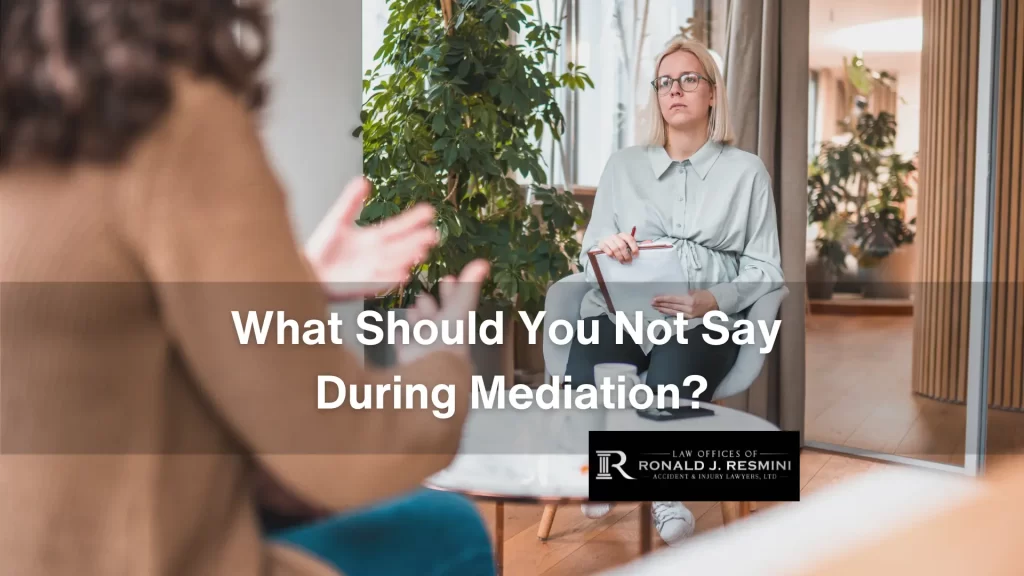 When you are injured because of someone else’s negligence, you can pursue the compensation you deserve in a personal injury claim. Eventually, mediation for a personal injury claim may be a resource. It can be entered into voluntarily, or it may be court-ordered. During the mediation process, a neutral third party facilitates communication between the parties to reach a resolution. Unfortunately, it does not always end with a settlement agreement. You should follow these tips about what not to say in mediation to improve your chances of a successful resolution to your personal injury case.
When you are injured because of someone else’s negligence, you can pursue the compensation you deserve in a personal injury claim. Eventually, mediation for a personal injury claim may be a resource. It can be entered into voluntarily, or it may be court-ordered. During the mediation process, a neutral third party facilitates communication between the parties to reach a resolution. Unfortunately, it does not always end with a settlement agreement. You should follow these tips about what not to say in mediation to improve your chances of a successful resolution to your personal injury case.
Don’t Be Disrespectful
Respect is essential when people must work together, and mediation requires compromise. Being disrespectful during personal injury mediation may lead to more conflict and decrease the chances of successful mediation. People are less inclined to compromise with people who are being disrespectful, and the only way that mediation can work is if the parties are willing to work together to resolve the case.
Personal injury mediation is not legally binding unless the parties enter a settlement agreement, so being disrespectful can end with a lawsuit going to trial instead of resolving the dispute in a mutually satisfactory way. You do not have to be overly friendly, but you cannot be disrespectful if you want a successful mediation.
Personal Injury Mediation Is Not About Blame
It may be easy to establish who is at fault, but you do not want to go into mediation saying things like, “This is all your fault” or “If not for you, I wouldn’t have been injured.” Placing blame can raise the other party’s guard, which could make them less likely to compromise.
While you want to appear confident about your personal injury case, you do not want to say anything that will put up the other party’s defenses or make them angry. You need them as much as they need you for a successful mediation, so save the blame game for the court if it should fail.
Don’t Demand More Money
Before personal injury mediation, you will have already made a demand for a certain amount of compensation. That compensation amount was rejected because the defense believed it was unfair. Going into it and asking for more money than you have been demanding will likely end the process before it begins. If you feel like the compensation originally requested was too low, adjusting it during mediation is not the way to go.
Don’t Introduce Brand New Information
During mediation, each party will give an opening statement and discuss evidence that could be used during the trial. However, if you recently discovered new information, waiting to present it until the day of mediation drastically decreases your chances of success.
When parties receive new information, they want to review, analyze, and evaluate its validity. Providing new, unexpected information could terminate the mediation because the other party would want to examine the evidence to determine whether the value of the case has changed in light of that new evidence.
Don’t Say, “That’s Confidential Information”
Information is power, but refusing to discuss certain things reduces the chances of a successful mediation. During a trial, very few things will remain confidential. Therefore, if your attorney believes that the other party will discover or use the information during the lawsuit, you should share it to help settle your case.
Personal injury mediation is confidential, so anything presented will remain confidential. If you have information that can increase your odds of success, share it. You want the other side to see the strengths of your case so that they are more willing to enter a settlement agreement. Refusing to share that information by stating it is confidential will likely make them skeptical about the strength of your case, causing them to be less willing to settle.
Does sharing certain information make you nervous? Discuss it with your attorney so they can assess whether it should be used during your personal injury mediation.
Don’t Make Ultimatums
 Avoid saying, “If you don’t give me x, I will take this case to trial.” Personal injury mediation is about working together toward a mutual resolution. Issuing an ultimatum is not “working together” and will decrease your chances of success. Ultimatums automatically put people on the defensive, which you want to avoid.
Avoid saying, “If you don’t give me x, I will take this case to trial.” Personal injury mediation is about working together toward a mutual resolution. Issuing an ultimatum is not “working together” and will decrease your chances of success. Ultimatums automatically put people on the defensive, which you want to avoid.
Contact a Rhode Island Personal Injury Attorney
Preparing for personal injury mediation can be stressful because you may be doing something unfamiliar, but it doesn’t have to be. The experienced attorneys from The Law Offices of Ronald J. Resmini, Accident & Injury Lawyers, Ltd. are experienced in preparing and representing clients during the whole personal injury process.
If you want to increase your chances of a successful outcome, contact us today at (401) 444-4444 or through our online form.
